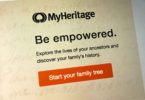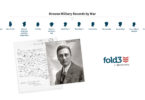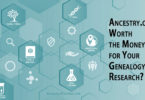You can never have too many free family history research tools at your disposal. As a serious genealogist, you, of course, will want to invest in a membership at Ancestry.com at a minimum, as it has record sets you will not find anywhere else except the original source (or sets that are available elsewhere online, but not indexed anywhere else). Yet, you cannot rely on it entirely. And, when you are just starting out as a genealogist, or when your travel and document-ordering budget is low, using free genealogical resources is going to be of invaluable assistance to you in building your family tree.
You probably already know about the major free resources, such as FamilySearch.org, Old Fulton Postcards, and the US GenWeb Project. Anyone who has been doing genealogy research for even a short period of time probably knows about these, as they are among the first things you will find when doing searches online for genealogical information. The good news is, there are plenty of other free resources available to you, too, and one or more of them might be just the key to connect you with your ancestors.
Here are some free genealogical resources you may not have considered, but should be using in your research.
This is Lisa Louise Cooke’s free genealogy newsletter. If you go to the website, you can sign up for the newsletter to be sent to you via email. The newsletter contains tutorials on how to do research, as well as news on record sources and upcoming genealogical events you may want to attend. She is a well-known genealogy speaker, and her newsletter is an informational resource you do not want to miss.
This is the daily genealogy newsletter of famed genealogist, Dick Eastman. He puts a new one out every day, with each newsletter containing important genealogical information on research methods, records, websites, and more, as well as relevant links you may want to explore in your own family history research.
This is the website of the Genealogical Publishing Company. This Baltimore-based bookseller and publisher has a good collection of suggestions for genealogy research and resource books that may be of use to you in your own genealogical pursuits. Their website also sometimes has essays written by employees or guest writer on genealogical research topics.
This is the website of the Athens-Clark Public Library System in Athens, Georgia. It has a list of genealogical lectures and lectures on local history that are going on in northern Georgia. If you are in the area, it is worth signing up for their free e-newsletter so you can get this information. Simply go to the main website, then the Athens-Clarke County Library site, then the Heritage Room site, and then the “Join Our Mailing List” site.
This is the website of the Vietnam Veterans Memorial Association. It has a “Wall of Faces” project online, which has a goal of making sure every soldier who died in the Vietnam war has a photograph of them posted online. You may find your Vietnam war ancestors on there, and maybe biographical information on them that could help you in your genealogical research. The website is still looking for more than four thousand photographs to complete their Wall of Faces project, and if you have one of those missing photos, you could do a good genealogical deed and contribute it to the wall.
While this one may seem like one of those typical “directory” sites online where you can look up the names, addresses, and phone numbers of living people (sometimes for a fee to get the good information), it’s not just that. You can actually locate some good genealogical information here. If someone is deceased but has not been for too long, their information may still be up there. You will usually find their current address and phone number, but also a list of previous addresses and phone numbers going back into the far past. In addition, most people have a list of “possible relatives” and “possible associates,” each with a link to their own listing. This can be extremely useful for tracking down long-lost relatives, as well as connecting families you suspect, are connected but were not previously sure. You may even find a date of birth or age of someone you were not previously sure about. This works with the listings for living people, too.
This is an excellent free resource for reading old published family histories, and county and local histories. Plenty of these old books, many of which were published in the 1800s and early 1900s, are fully scanned and searchable by name and/or word. Just go to the site, type in your search phrase, and you will be given a list of all the scanned books that contain it. Find the books that you believe are right for you, read through them (your search terms will be in yellow highlight on the pages where they are located, making it easy for you to find them), and discover new and interesting things about your ancestors and their heritage and contemporary (to the book) families.
This free online family tree is contributed to by people across the world. Just type in a surname (and the first name with it, if you have one or want to use one), and get started at looking at what other people have posted about your ancestors. You may find mistakes, as not everyone does careful research, but you may also find new information about ancestors you never knew about, and be able to use that information to connect generations. It may even help you break down that brick wall you’ve been trying to get past in your genealogical research.
There are plenty of free genealogical resources online. Make the most of them, back up what you find there with other sources to corroborate the information, and your family tree will be healthier and more robust for it, without breaking the bank.






